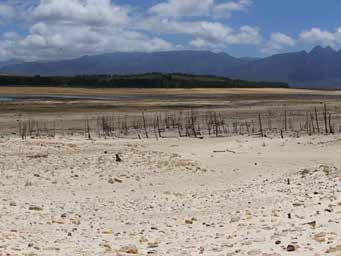
4 minute read
Water Security
Lessons in resilience
The three-year drought that gripped South Africa’s Western Cape region has many lessons in resilience to teach not only South Africa, but the rest of the world.
Advertisement
During 2017 and early 2018, over four million South Africans faced the terrifying prospect of running out of water when Cape Town announced a potential ‘Day Zero’. This would be the day when dam levels were so low that reticulation to most residential areas in the city would be
turned off and residents would have to queue every day for their daily rations of 25 litres per person at 200 manual water collection points around the city.
In the end, Day Zero was averted, as the daily drawdowns from the major dams feeding Cape Town were slowed dramatically and the rains of the 2018 winter rainfall season came early. But the brush with disaster had been too close. If the Day Zero disaster plan had been implemented, the consequences for Cape Town and its residents would have been catastrophically disruptive. Even the averted crisis had serious adverse consequences. Important sectors of the local economy, such as tourism, suffered substantial commercial costs as international travellers were scared away when the Day Zero story made global headlines. The reputational damage to the city was severe, and the social fabric of the city came under severe strain.
So, what can be learnt from this costly, narrowly averted disaster?
Learning from crisis by capturing insights It was in order to answer this question that project partners Peter Willis and Victor van Aswegen founded the Cape Town Drought Response Learning Initiative in mid-2018 in the wake of the crisis, shortly after the announcement by authorities that Day Zero was unlikely to happen that year.
Motivated by the twin insights that, first, the crisis was a multifaceted event, and second, a great many

people gained many new insights over the course of this intense period, they realised that there could be substantial social value in recording and gathering in one place the individual observations, analyses and reflections from senior societal actors who had been involved in crafting the city’s drought response and from acknowledged experts and researchers in the field.
Rather than asking people to record their views and recollections in writing, the decision was made to conduct and film in-depth interviews. This enabled interviewees to expand at length on camera, downloading their first-hand knowledge based on direct personal involvement in senior decision-making capacities during the crisis or sharing the results of their research work.
A total of 39 such interviews were conducted, with a total runtime of 43 hours, and all made publicly available as a learning resource on the project website www.droughtresponse-learning-initiative.org.
Interviewees were deliberately selected from a wide spectrum of sectors, ranging from government and business to intermediary organisations, NGOs, civil society and academia. The emphasis was on the diversity of points of view offered by widely varying individual perspectives, ranging from the deputy mayor to an informal settlement dweller, from independent consultants to leaders of major businesses.
Learning from crisis by distilling lessons From this rich resource of wide-ranging insights captured on film, the key themes and learnings were then identified and three series of 56 filmbased learning outputs were produced, all again made available on the project website.
The flagship output of the initiative is the Learning from Crisis series. Each of the 16 films in the series draws together multiple voices and viewpoints on a particular subject – on average six or seven interviewees setting out the key points on a topic in about 20 minutes. This gives the user a quick and efficient introduction to each of these important topics to have emerged from the crisis, with the opportunity to listen to and watch knowledgeable people discuss the subject.
True to the multifaceted nature of the crisis event, these cover a wide range of subjects, demonstrated by the following sample of topics covered in the series: • Adapting to climate change • Effecting household behaviour change • You can’t build yourself out of a drought • Inequality and social cohesion in a crisis • Feasibility of the Day Zero disaster plan • System management and operational issues • The governance challenge • Suspend the politics • A new relationship with water • Is Cape Town more resilient now? Each of the 16 modules in the series also contains a text component accompanying the film and summarising its key points to facilitate learning. In addition to the Learning from Crisis series, there are also two series of 40 shorter clips, of around five minutes each. The Spotlight series offers briefings on a specialised topic of which the interviewee has expert knowledge rooted in deep professional engagement and personal involvement during the crisis. The Viewpoint series contains brief, digestible opinion pieces in which the interviewees express personal points of view.
The Cape Town Drought Response Learning Initiative was undertaken in association with the University of Cape Town’s African Climate and Development Initiative, in partnership with lead donor The Resilience Shift, and with the generous additional support of Old Mutual, Nedbank, Woolworths, Aurecon, PwC, GreenCape, Arup, and 100 Resilient Cities.
It is an invaluable resource, making widely accessible the important lessons learnt in Cape Town, distilled from an intense two-year engagement with the subject, with particular relevance to other rainfall-dependent cities around the world.
Would you like to know more? www.drought-response-learninginitiative.org












